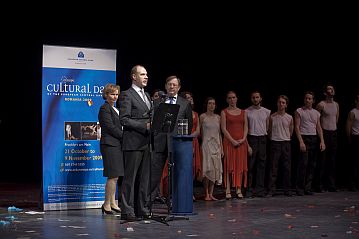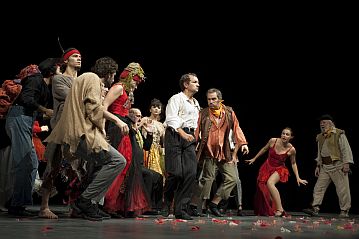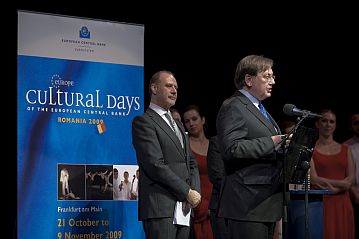Liebe Frau Tumpel-Gugerel,
Lieber Präsident Wellink,
Sehr geehrte Gäste aus Rumänien und Freunde der Kulturtage der EZB,
Meine Damen und Herren,

Copyright © ECB, 2009
Let me first thank Frau Tumpel-Gugerell for the kind and thoughtful words of introduction and for the steady support and friendship that all colleagues from the European Central Bank have shown the National Bank of Romania along the years.
I would like to briefly reflect not only upon the performance we have seen – or, better said, taken part in - tonight, for it is the merit of Dan Puric and his team to have vividly involved the spectators in the recounting of a story whose issues are timeless and whose roots go back beyond Cervantes, and mingle with those of commedia dell’arte and popular theatrical stagings throughout Europe from the Middle Ages onwards, providing a lay parallel to passion plays. If Bertolt Brecht and Kurt Weill ever had children with Dario Fo, they would look like this!
I would also like to recount, without exhausting, the wealth and diversity of events that the past three weeks have offered: photographic exhibitions of Brancusi “seeing” his own work, Mircea Cartarescu “reading” himself, film, painting, philatelic and numismatic exhibitions, theater, children’s literature, and, of course, music. From classical music, either in large venues such as the one tonight, to smaller, more intimate chamber music and piano recitals, to a mingling of voices from classical and folk instruments – organ and pan-pipe. The inaugural concert programme was built around Enescu and Beethoven, and I believe it not only underlined a discreet underpinning of continuity across countries and historical periods – with Beethoven being Brahms’s model of symphonic composition, while Brahms himself took an important part in shaping the musicality of young Enescu – but also, for the latter composer, it gave a glimpse of how academic composition around the emergence of neo-classicism could mix with melodic inspiration from national and ethnic roots. The same was apparent in the lively mixture of idioms and techniques in free-spirited jazz performances.
It is, I believe, a meaningful and happy coming together that the closing performance of the Romanian Cultural Days 2009 in Frankfurt is taking place on the same day as the celebrations of the fall of the Berlin Wall twenty years ago, which also catalyzed the start of Romania’s process of democratic transformation. A shared identity – at all times informed and supported by history and culture, both forms of collective memory, with culture perhaps the more powerful and instinctive one – has made it possible for these events throughout Central and Eastern Europe to reshape history, straighten out distortions, and bring us closer together.
I would like to thank all the artists, writers, performers and historians who took part in the Cultural Days for their wholehearted effort. Thanks are due also to the ECB and NBR staff and all others involved for the excellent organization which contributed to making this series of events – I am told - a success. I would also like to extend my special thanks to the public and to the media for the openness and interest they honoured us with and, last but not least, to the city of Frankfurt am Main which has hosted these special events.
Finally, I would like to invite Nout Wellink, Governor of De Nederlandsche Bank, to the stage, in order to pass on to him the Cultural Days trophy. Next year, the Cultural Days will focus on the Netherlands, a country whose charm, culture and tradition of straightforwardness I am sure are familiar to all of you. But please allow me to be a central banker for a moment, while injecting a note of levity at the same time: with all the talk surrounding the global financial crisis, liquidity management has been getting a lot of coverage. Let us not overlook the fact that the nation which managed to literally build a country on the successful implementation of this concept are the Dutch! And, ending on a more reflective note, that is one more thing that central banks and culture have in common: providing a solid foundation on which individuals can build. Central banking aspires to this, but it is the merit of culture to underpin organically the substance of such a bedrock. I hope that the cultural bridges built during these events will grow even stronger over time.
Thank you for your kind attention and for your involved participation in the Romanian Cultural Days at the ECB. Ich bedanke mich ganz herzlich für Ihre Aufmerksamkeit und Ihr Interesse an den Kulturtagen der EZB – Rumänien 2009.


Copyright © ECB, 2009